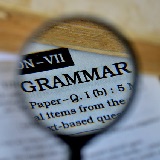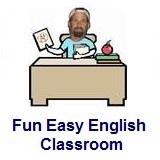|
|
| |
|
|
| |
|
|
| Fun Easy English Classroom April 10 |
|
| |
Classroom
Today
Learn about
English
reciprocal pronouns |
|

Today in the Fun Easy English classroom you are going to learn about
reciprocal pronouns an important part of English
grammar. |
 Hey
if you cannot understand something on this page, Hey
if you cannot understand something on this page,
then use the Fun Easy English
dictionary
(opens in a new window) |
|
|
|
 Grammar:
Reciprocal
Pronouns Grammar:
Reciprocal
Pronouns
Definition of a
reciprocal pronoun. |
- A reciprocal pronoun is:
- a word that refers back to the
subject and shows that the action of the
verb is a two-way action
- in the
object position
|
- The students congratulated each other.
- The team members complimented one another.
|
|
 From
YOUR Teacher: Reciprocal
Pronouns From
YOUR Teacher: Reciprocal
Pronouns
Reciprocal pronouns are words which refer back to the
subject and shows that the action of the
verb is a two-way action.
The students congratulated the
other students, becomes, The students congratulated each other.
Each other replaces
the other students. |
|
|
|
|
|
Additional Lessons |
 About These
Lessons About These
Lessons
The following classroom lessons are great for students
who want additional conversation, listening, and reading
practice. |
-
Conversation Lesson -
Beginner Level. Dialogs for everyday use.
Short situational dialogs for students of English as
a Foreign (EFL) or Second (ESL) Language with a
written conversation and a conversation notes
section.
|
 Conversation Lesson
18 - Musical Instruments Conversation Lesson
18 - Musical Instruments
(Beginner -
Conversation, Reading)
Dialogs for everyday use. Short situational dialogs for
students of English as a Foreign (EFL) or Second (ESL)
Language. |
Musical Instruments
Anne: Listen! Somebody’s playing the piano.
Betty: Yeah, it sounds nice, doesn’t it?
I wish I could play a
musical instrument.
Anne: Don’t you play the violin?
Betty: No, but my sister
does. Actually, she’s pretty good at it.
Anne: I took flute lessons for a couple
of years, but I never learned to play very well. I guess I don’t have any musical talent.
Betty: Oh, that’s not true. You sing very well. I can’t even do
that! |
|
Conversation Notes |
- Yeah
- An informal variant of yes. Doesn’t it? The falling
intonation on this question tag shows that it is simply a conversational
element not requiring an answer.
- I wish I could
- Note that could is a past tense form, as required after
wish.
- Don’t you play
- The negative question implies that the speaker expects
the answer to be affirmative. It is equivalent to You play the violin, don’t
you? with a rising intonation on the final you.
- my sister does
- Does is a proverb, standing in place of the verb. The
sentence means My sister plays the violin.
- flute lessons
- A compound noun, with the principal stress on the first
word.
|
|
Source: U.S. State Department |
|
Additional Conversation |
 Conversation Conversation
This is a collection of 36 situational conversations
which focus on spoken American English in a relatively
natural way....these
lessons are for intermediate students. |
 Conversation Conversation
This is a collection of 30 situational conversations. Each conversation is
accompanied by language notes....these
lessons are for advanced students. |
 Conversation Conversation
English conversation lessons. 52
lessons covering pronunciation, speaking,
writing, and grammar topics....these
lessons are for beginning students. |
 Conversation Conversation
English conversation lessons. 30
lessons focusing mostly on communication and
grammar topics....these
lessons are for intermediate students. |
|
|
|
|
|
|
|
 Hey Students, Hey Students,
Use this dictionary and reference to look up any words you do not
understand in Fun Easy English.
Note: search opens in a new tab. |
|
|
|
|
|
Search Fun Easy English |
|
|
|
|
|
|
|
|
|
|
|
|
|
|
|
About
Contact
Copyright
Resources
Site Map |